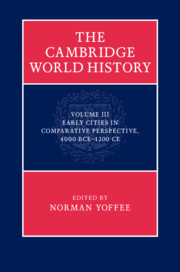Book contents
- The Cambridge World History
- Series page
- The Cambridge World History
- Copyright page
- Contents
- Figures
- Maps
- Tables
- Contributors
- Preface
- 1 Introduction: a history of the study of early cities
- Part I Early cities as arenas of performance
- Part II Early cities and information technologies
- Part III Early urban landscapes
- Part IV Early cities and the distribution of power
- 15 Ancient South Asian cities in their regions
- 16 Greek cities in the first millenniumBCE
- 17 Different cities: Jenne-jeno and African urbanism
- 18 The distribution of power: hierarchy and its discontents
- Part V Early cities as creations
- Part VI Early imperial cities
- Index
18 - The distribution of power: hierarchy and its discontents
from Part IV - Early cities and the distribution of power
Published online by Cambridge University Press: 05 March 2015
- The Cambridge World History
- Series page
- The Cambridge World History
- Copyright page
- Contents
- Figures
- Maps
- Tables
- Contributors
- Preface
- 1 Introduction: a history of the study of early cities
- Part I Early cities as arenas of performance
- Part II Early cities and information technologies
- Part III Early urban landscapes
- Part IV Early cities and the distribution of power
- 15 Ancient South Asian cities in their regions
- 16 Greek cities in the first millenniumBCE
- 17 Different cities: Jenne-jeno and African urbanism
- 18 The distribution of power: hierarchy and its discontents
- Part V Early cities as creations
- Part VI Early imperial cities
- Index
Summary
Keywords
- Type
- Chapter
- Information
- The Cambridge World History , pp. 381 - 394Publisher: Cambridge University PressPrint publication year: 2015
- 4
- Cited by

